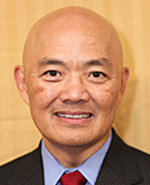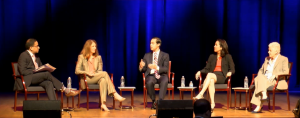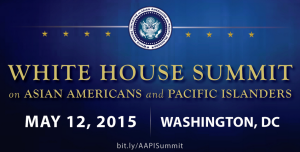The White House Summit on Asian Americans and Pacific Islanders on May 12, 2015, in Washington, D.C., may arguably have been the crowning event of this year’s Asian American and Pacific Islander (AAPI) Heritage Month. Present were nearly 2,000 community leaders and activists, federal representatives (including six Cabinet-level secretaries), and guests, representing more than 40 states and the Pacific Islands. The Summit’s agenda? What had been accomplished in six years by the Obama Administration for AAPIs and the unfinished business and challenges that lay ahead.
In 2009, an Executive Order from President Obama created the President’s Advisory Commission on AAPIs and the Initiative’s Interagency Working Group, representing 24 federal agencies and offices. Their objectives were monitoring the AAPI communities nationwide, identifying unmet needs and establishing outreach and opportunities for these communities to access federal resources.
The AAPI White House Summit bundled serious discourse, sales pitches,and pep rallies as well as entertainment based on themes of “actions equal results/” The theme resonated both with advocacy newcomers and veterans. Says  attendee Edmund Gor, president of the Chinese American Citizens Alliance, the nation’s oldest civil rights and advocacy organization, established in 1895: “In a single day if we can connect with the Federal agency heads who can address health care, education, immigration or jobs, and meet others in other areas with similar concerns, then sharing these ideas and hearing success stories and lessons learned will move us farther along the path to addressing those issues.”
attendee Edmund Gor, president of the Chinese American Citizens Alliance, the nation’s oldest civil rights and advocacy organization, established in 1895: “In a single day if we can connect with the Federal agency heads who can address health care, education, immigration or jobs, and meet others in other areas with similar concerns, then sharing these ideas and hearing success stories and lessons learned will move us farther along the path to addressing those issues.”
Kicking starting the day-long program, President Obama evoked fond memories of his AAPI heritage (he grew in Hawaii and in Indonesia) in a videotaped opening address to the assembly at George Washington University’s Lisner Auditorium. The President lauded the throng of advocates for their civic and community engagement, “from helping non-English speakers sign up for healthcare, to helping young dreamers, to encouraging eligible immigrants to become eligible citizens.”
The day-long, event-filled gathering seemed to target Obama’s AAPI “young dreamers,” a demographic that has become the fastest growing racial group in the United States. The AAPI population is expected to double to more than 47 million by 2060, according to Federal estimates.
Summit organizers understood and played to the post-baby boom audience: staging the delivery of serious content blending solemnity (A Hawaiian chant that honored of the Nepalese victims of the devastating April 25 earthquake) and hilarity—notably Master of Ceremonies Parag Mehta, whose comedic observations on national issues and colorful wardrobe changes, overshadowed his day job as Surgeon General Vivek Murthy chief of staff. Selfies taken throughout the day supplanted business card exchanges as the norm of introduction and networking.
With 20 month left of his executive power, President Obama is hamstrung by Congressional deadlock and the perennial curse of presidents entering their final terms. Thus, the theme driving the moderated “Fireside Chats” with cabinet secretaries and high-ranking Administration officials focused on the roles they played in advancing AAPI issues in the six years following the Initiative’s inception, while imparting encouraging statistics and leadership wisdom to Summit attendees to soldier on.
 Secretary of Labor Tom Perez advocated effective data collection methodologies and analysis as instrumental in dispelling the model minority myth by revealing AAPI group particulars and inequities. Secretary of Interior Sally Jewell stressed the importance of preserving AAPI landmarks to serve as centerpieces for narrating a people’s history. Maria Contreras-Sweet, Administrator, U.S. Small Business Administration, confirmed that more than 7,500 loans totaling approximately $4.8 billion were awarded to AAPI small business owners across the country in 2014. A chorus of speakers emphasized increasing cross-generational cooperation, encouraging careers in public service and enhancing AAPIs private sector influence by populating corporate boardrooms.
Secretary of Labor Tom Perez advocated effective data collection methodologies and analysis as instrumental in dispelling the model minority myth by revealing AAPI group particulars and inequities. Secretary of Interior Sally Jewell stressed the importance of preserving AAPI landmarks to serve as centerpieces for narrating a people’s history. Maria Contreras-Sweet, Administrator, U.S. Small Business Administration, confirmed that more than 7,500 loans totaling approximately $4.8 billion were awarded to AAPI small business owners across the country in 2014. A chorus of speakers emphasized increasing cross-generational cooperation, encouraging careers in public service and enhancing AAPIs private sector influence by populating corporate boardrooms.
The Summit’s final panel lineup, “#APAEverywhere: A Look Forward” was not peopled by politicians but performers, spotlighting the impact of today’s media-driven culture on the public discourse of critical issues. Appearing on stage were AAPI television actors who represented shifts from typecasting to mainstream portrayals and bright hopefuls like 11-year-old Hudson Yang from the hit series Fresh Off the Boat.
Because AAPIs history of acceptance is stained by hardship and enduring prejudice, the battleground of civil rights continues to see Asians at the forefront of efforts for justice and equality. In the afternoon breakout session “50 Years later: New Voices & Strategies for Civil and Human Rights,” Some speakers concurred that AAPIs efforts should focus less on ethnic issues and center their efforts around embracing themes, much like the Selma marches in 1965 were about fighting for voting rights for all. Even with a landmark election of an African American as president, post-racial America looms in the far distance, affirmed by panelist author and activist Helen Zia contending that “What does an American look like?” will define gender and sexual discrimination issues in the 21st Century workplace.
At this breakout session’s Q&A, an audience member confronted the panelists about the worth of “fighting for a seat at the table” when he claimed that the foundation of America was built on injustice and injury. The response by speaker Sapreet Kaur, executive director of the Sikh Coalition, could serve as an apt summation of the purpose for the AAPI White House Summit: “I have to think my efforts will mean something. I have to believe change is possible.”
More information on the White House Summit on Asian Americans and Pacific Islanders can be found here.
(Rick Eng is a community activist who serves as secretary of the Chinese American Citizens Alliance, Los Angeles Chapter, and sits on the Boards of the Chinese Historical Society of Southern California and the El Pueblo Park Association for the El Pueblo de Los Angeles Historical Monument. Involved in civil rights, education and historic preservation, he currently resides in Long Beach, California.)


